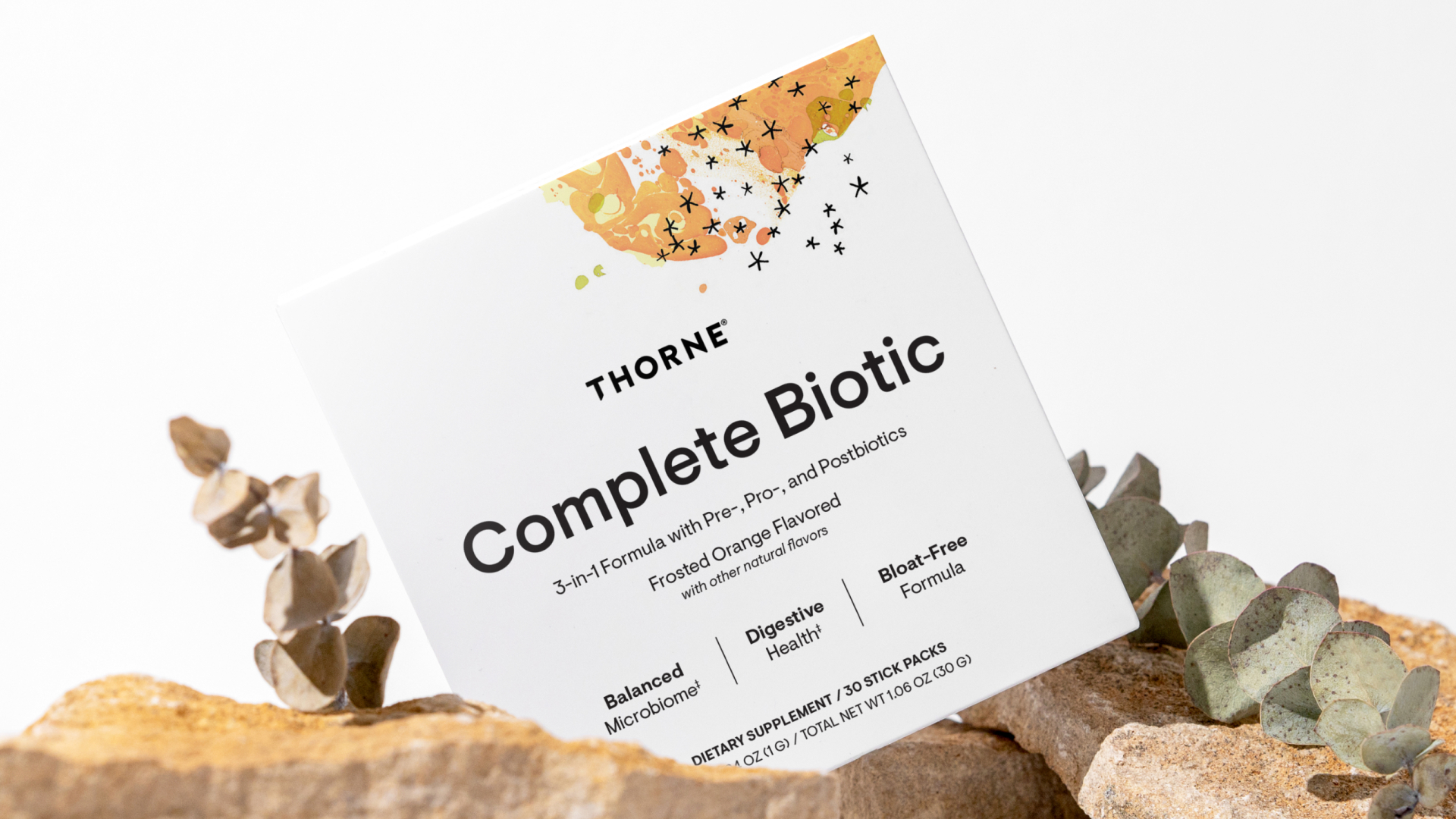Know Your Biotics: Pre-, Pro-, and Postbiotics

In the past, you probably heard a lot about biotics – in the form of antibiotics. These days you are likely to hear as much about probiotics as you do antibiotics. The term biotic literally means “caused or produced by living beings.” While antibiotics are designed to attack and neutralize the bugs that are making you sick, probiotics are living organisms that can benefit health. In addition to probiotics, this article sheds light on other beneficial biotics – prebiotics, postbiotics, and synbiotics.
What are probiotics?
Probiotics are live organisms (bacteria or yeast) that are either the same as or very similar to the organisms already in or on your body and have a beneficial effect on one or more of the microbiomes in your body – gut, skin, or genitourinary tract, for example. These live organisms can be consumed as a nutritional supplement or through foods to help maintain and augment your natural internal microbiomes. Probiotics are even showing up in skin-care products as science continues to learn more about the importance of supporting the microorganisms in, as well as on, your body. Foods containing beneficial microorganisms include fermented foods like yogurt, kefir, kimchi, sauerkraut, miso, and tempeh – foods from many different cultures.
The most well-studied benefits of probiotics are for gastrointestinal health, bowel regularity, and repopulating the gut microbiome after an infection or use of an antibiotic. Specific strains can also support immunity, metabolic health, allergies, emotional well-being, and performance.* There are literally hundreds of organisms included in probiotic supplements, so if you are seeking a particular benefit, then it’s important to make sure you have the right product to do the job. And when it comes to probiotics, more is not always better. It’s important to take probiotics containing beneficial microbes that play well together. And, having a huge number of active organisms might not be as important as having a very stable probiotic or one that uses a stable delivery system (like a capsule that resists destruction by stomach acid, for example).
What are prebiotics?
Prebiotics serve as the food that nourishes the good bacteria residing in your gut, providing them with the tools they need to thrive and colonize. Prebiotics in your diet can come from a variety of plant fibers, including garlic, onions, artichoke, asparagus, apples, broccoli, and bananas. These fibers, indigestible by our own enzymes, pass undigested to the large intestine where they provide a feast for carbohydrate-loving beneficial bacteria.
Beyond fiber content, antioxidant-rich foods, such as pomegranate, blueberries, and green tea, provide prebiotic benefits via their rich polyphenol content. These unique compounds have been found to improve the intestinal environment by promoting the growth of beneficial bacteria.
Bacteriophages are another type of prebiotic. Also known as phages, they are the most common organisms on the planet – there are more bacteriophages than all other living organisms on the earth combined, including bacteria. Composed of proteins, bacteriophages are the natural enemies of various strains of harmful bacteria but are harmless to humans, animals, and plants. Bacteriophages target specific bacteria in the gut, thus helping to balance the functional aspects of your gut population. Basically, bacteriophages are prebiotics because they provide a supportive environment in which beneficial bacteria can thrive.* You can read more about them here.
Prebiotics allow the bacteria in your gut to make beneficial compounds in the intestines (postbiotics) such as short-chain fatty acids that can be released into the bloodstream, allowing prebiotics to indirectly impact the health of distant organs.
What is a synbiotic?
Quite simply, a synbiotic is a supplement that contains both a prebiotic and a probiotic. The “syn” stands for synergistic – the pre- and probiotic exert synergistic effects. Synbiotics should not be mistaken for symbiotics. Symbiotic is a broader-ranging term that refers to any organisms living in harmony for mutual benefits.
What are postbiotics?
Although probiotics have taken center stage, with prebiotics taking a supporting role, postbiotics are in the wings, waiting for their moment in the spotlight. And as more research emerges, they are starting to play a more important role in the biotic discussion. Postbiotics are metabolic byproducts that result when probiotics feed on prebiotics. They are comprised of cell-wall components, short-chain fatty acids, enzymes, vitamins, organic acids, and others; they’re secreted from live bacteria and are also released when live bacteria die. The signaling molecules present in postbiotics are being studied for support of balanced inflammatory responses, immune health, metabolism, and cardiovascular health.* They are typically included in a “biotic” supplement in the form of beneficial bacteria that have been heat-killed.
Thorne’s biotic offerings
Thorne offers a wide range of probiotics to support many individual needs, in addition to two fiber-containing prebiotic products – FiberMend® and EnteroMend® – to support your health.*
And pulling it all together for 360-degree gut health support, meet Complete Biotic – a combination of one bacteriophage-combo prebiotic, one stable, spore-forming probiotic, and one heat-killed postbiotic – all in a great-tasting, orange-flavored, fast-melt powder in single-serve stick packs.
Just one stick pack of Complete Biotic each day provides extensive support for a healthy microbiome with well-studied biotics to benefit bowel regularity, stool consistency, intestinal comfort, and growth of beneficial bacteria.*

